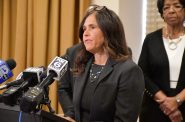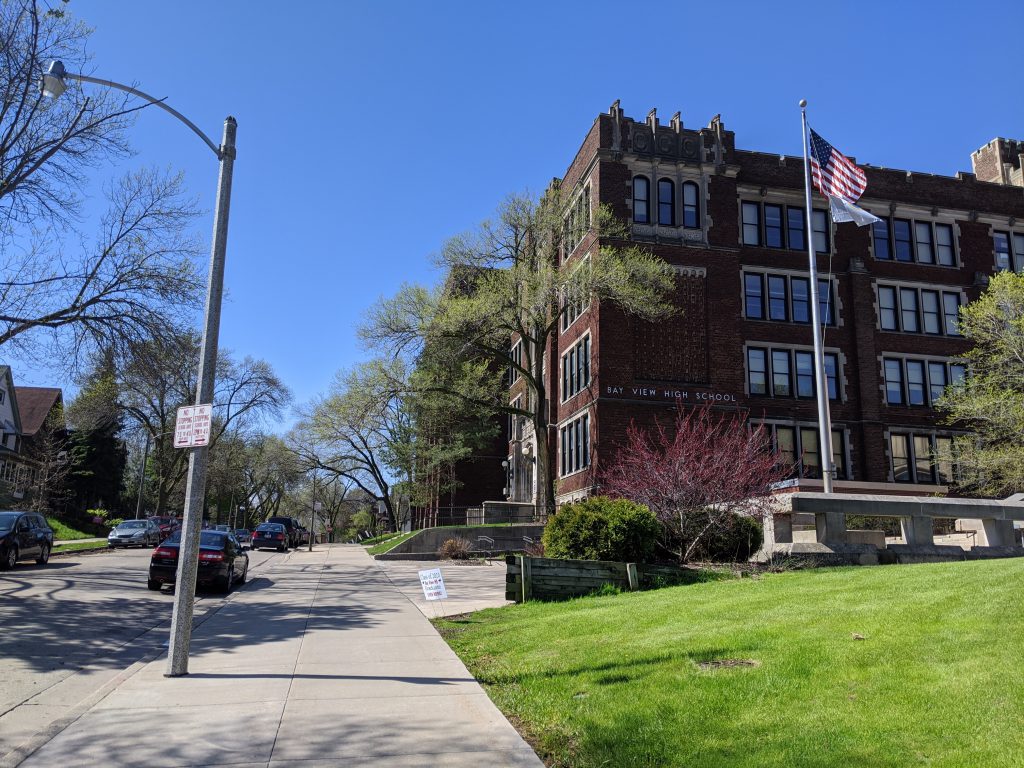MPS Plans $60 Million In Budget Cuts
School referendum dollars and resulting state funding hikes come in slowly.
Milwaukee Public Schools is already hearing from groups wanting money for their programs after voters approved the $252 million referendum. In reality, the referendum was only to keep the district afloat and fund current needs.
In fact, the referendum doesn’t even do that; MPS needs to cut some $60 million from its budget. Some groups understand that cuts are coming, said Superintendent Keith Posley in an interview with Urban Milwaukee. “Individuals are coming reminding us of the validity of their programs,” he noted.
The district needed at least an additional $200 million to maintain existing programs, but will receive only $140 million from the referendum’s first year. The district will also lose its federal ESSER pandemic funding after this school year.
When Milwaukee voters approved an increase in spending limits in April by $252 million, it did not automatically authorize an increase in property taxes by the same amount. The majority of the $252 million will not be directly paid for by Milwaukee property taxpayers. Over time, the total overall tax increase to Milwaukee taxpayers will be approximately $128 million each year. The remainder will be paid for by the state, as the MPS Referendum Proposal (see slide 14) explained.
The state of Wisconsin’s average school revenue limit is just under $12,000 per student per year. The formula of how much each district will get from the state is based on a number of factors: the total number of students, how much money a district spends in a previous year, the property values in the district, and what the district is willing to spend to reach the revenue limit. If a district wants to spend more than the revenue limit, it must ask its voters in a referendum. Then, when a district spends that additional money, it will increase the amount of revenue from the state in the following years.
That is what MPS did when it asked for $87 million in 2020. The full $87 million was not available in year one. The revenue limit increased by $57 million the first year. By spending that newly available money, the amount of revenue from the state increased in the following years.
This time around, MPS asked for an increase to the limit of an additional $252 million, but only $140 million for the first year (2024-25) even though the district said it needed an addition $200 million just to keep existing programs. Revenue limits increase in increments over the following three years: by $51 million in 2025-26, $47 million in 2026-27, and finally by $14 million in 2027-28. This keeps the property tax increases in the future years considerably smaller as the amount of revenue from the state increases due to the district spending more.
School districts also receive categorical aid to fund special needs. Special education students cost a district significantly more to educate. The reimbursement by the State of Wisconsin is set at around 30% of the costs over $30,000 per pupil. In the 1970s, the rate was much higher, around 70%. The school district also receives some federal funds, but those funds are not counted as part of the district’s statutory budget.
School districts across the state are going to referendum because the state funding has not kept up with inflation and the Legislature hasn’t addressed this even though it is sitting on a surplus of over $3 billion.
The superintendent’s proposed budget for next school year will be released by the school board on April 26. However, we have some idea where some cuts may come. Here are some of the things to watch for in the budget.
Each school had to prepare a proposed budget to submit to the administration including the impact of passing the referendum. School budgets appear to keep existing staffing including AMP (art, music, physical education) teachers.
However, MPS loses any new revenue from federal ESSER pandemic funds. These one-time funds were used by MPS mostly for one-time projects like building upgrades. Roughly $32 million was used for additional support staff over a five-year period, including $15 -$16 million for this year.
“We are moving our tutoring from our ESSER budget to our board budget,” said Posley. However, some programs will be cut regardless of their funding source. Gone are Trauma Informed Coaches. Also gone are 10 Work-based Learning Specialists. “All year we were told that if the referendum passed, we would more than likely be kept. The referendum also stated some of the funds would be used for career and technical education…which is our department. But it looks like we’re now a part of the new cuts,” said Heather Harper, an MPS learning specialist, in remarks to Urban Milwaukee.
“We are moving some teachers to the classroom from the central administration building,” said Posley. “Our first goal is to fill vacancies at schools.” Schools needing teachers may discover that their vacancies may not be filled only with newly trained educators; they may come from central office.
The district has only a handful of buildings it can abandon on such short notice. Closing a school may also mean increasing the cost of busing. Few dollars will be saved there.
Pay and benefits for employees are pretty much locked in. With the shortage of educators statewide and nationally, districts have been in a bidding war to keep or hire employees. In addition to inflation, the major cost to districts is wages and benefits, especially dramatic increases in health insurance.
Board members aren’t sure where the additional cuts will come from and will wait for the superintendent’s proposed budget just like everyone else.
The superintendent is only submitting a proposed budget. In May, the board will hear from the public in open meetings, and board members will submit budget amendments. Typically, board members ask for additional spending, increasing some programs, creating new ones. However, board members must also state where the funds will come from — what programs will be reduced and eliminated.
Odds are, there will be some agonizing decisions made to reach the goal of cutting $60 million.
If you think stories like this are important, become a member of Urban Milwaukee and help support real, independent journalism. Plus you get some cool added benefits.
More about the 2024 MPS Referendum
- After MPS Issue, GOP Lawmakers Would Require Financial Reporting Before Referendums - Baylor Spears - Oct 5th, 2025
- K-12 Education: MPS Plans $60 Million In Budget Cuts - Terry Falk - Apr 22nd, 2024
- Following Referendum, MPS Cuts Trauma Specialists in 53206 ZIP Code - Corrinne Hess - Apr 17th, 2024
- MMAC statement on MPS referendum - Metropolitan Milwaukee Association of Commerce - Apr 3rd, 2024
- City Forward Collective Responds To The Outcome of the MPS Referendum - City Forward Collective - Apr 3rd, 2024
- MTEA President Ingrid Walker Henry: Statement on Passage of MPS Referendum - Milwaukee Teachers’ Education Association - Apr 2nd, 2024
- Statement from GMC on April 2nd MPS referendum - Greater Milwaukee Committee - Mar 26th, 2024
- MPS Referendum Would Reverse Effects of Declining State Funding - Graham Kilmer - Mar 12th, 2024
- K-12 Education: Is Building Surplus a Factor in MPS Referendum? - Terry Falk - Mar 11th, 2024
- Campaign Targets MPS Funding Referendum - Graham Kilmer - Feb 24th, 2024
Read more about 2024 MPS Referendum here
More about the MPS Financial Crisis
- New MPS Superintendent Left Prior Job During Period It Faced Similar Criticism - Corrinne Hess - Feb 14th, 2025
- MPS Audit Finds ‘Culture of Fear and Reluctance to Change’ - Jeramey Jannene - Feb 13th, 2025
- K-12 Education: Meet the New MPS Superintendent - Terry Falk - Feb 11th, 2025
- MPS Still Owes Financial Data To State - Corrinne Hess - Oct 15th, 2024
- K-12 Education: MPS Consultant Will Guide Decisions - Terry Falk - Oct 9th, 2024
- K-12 Education: Aycha Sawa Faces New Challenges as MPS Financial Officer - Terry Falk - Sep 24th, 2024
- Milwaukee School Board Recall Fails - Graham Kilmer - Aug 19th, 2024
- Gov. Evers Announces MGT Consulting of America Selected to Conduct Independent Audit of MPS Operations - Gov. Tony Evers - Jul 29th, 2024
- MTEA Files Ethics Complaint Against Secretive “Recall Collaborative” After Recall Organizers Admit to “Anonymous Donors” - Milwaukee Teachers’ Education Association - Jul 26th, 2024
- Milwaukee Board of School Directors Statement Regarding an Interim Superintendent of Schools - Milwaukee Public Schools - Jul 25th, 2024
Read more about MPS Financial Crisis here
K-12 Education
-
MPS Training in Science of Reading Going Poorly
 Nov 23rd, 2025 by Terry Falk
Nov 23rd, 2025 by Terry Falk
-
The Fear Factor at MPS
 Nov 11th, 2025 by Terry Falk
Nov 11th, 2025 by Terry Falk
-
MPS Reaching Out to Community
 Nov 2nd, 2025 by Terry Falk
Nov 2nd, 2025 by Terry Falk























Great explainer, thank you! Obviously a sad state of affairs, though